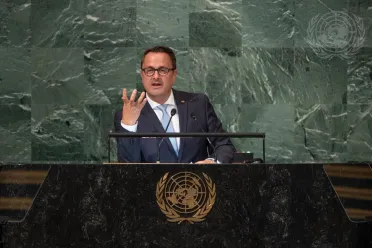Statement
Statement summary
XAVIER BETTEL, Prime Minister of Luxembourg, recalling the theme of this year’s General Assembly, underscored that the world is indeed at a watershed moment. He condemned the Russian Federation’s large-scale aggression in Ukraine and the role of Belarus in it, adding that the war is unprovoked, unjustified, and that it resurrects the spectre of world war. Spotlighting the Secretary-General’s condemnation of the Russian Federation, as well as the Assembly’s three resolutions condemning the war, he hailed the Member States’ unity despite the Russian Federation’s use of veto and the Security Council’s paralysis. He also expressed disappointment that, after his efforts to negotiate with Russian representatives at the United Nations, the Russian Federation declared new measures. Recounting his visit to Ukraine and his witnessing of horrific war crimes, he said: “Nobody can condemn a country or a generation or kill innocent people.”
Luxembourg has taken in more than 1,000 Ukrainian students, he said, also expressing admiration for the resilient women and men of Ukraine who have started to rebuild their liberated cities. He also saluted the courage of Russian citizens who are saying “no to war” despite repression. The Russian Federation will not know impunity for their war crimes or crimes against humanity, nor for the crimes of genocide and aggression, he stressed. Further, the war began just as the world was starting to recover from the crisis brought on by COVID‑19, and has exacerbated food insecurity affecting Africa and the Middle East. Citing blocked grain shipments in Ukraine and the spreading of false narratives in Africa that European sanctions were making the food crisis worse, he placed blame squarely on the Russian Federation and hailed the negotiations of the Secretary-General and Turkish President Recep Tayyip Erdoğan on the Black Sea Initiative.
Highlighting his country’s support for the World Food Program (WFP), the Food and Agriculture Organization (FAO) and the International Fund for Agricultural Development (IFAD), he said Luxembourg will continue to allocate 20 per cent of its humanitarian budget to that end. Also detailing its financial allocation strategies, he noted that Luxembourg will dedicate 1 per cent of its annual gross revenue to official development assistance (ODA). “We can all hold meetings about commitments, but we need to fulfil our commitments,” he emphasized, adding that the Government increased its climate financing to €220 million between 2021 and 2023. This is in addition to its yearly budget, half of which goes to climate change adaptation in developing countries. Luxembourg will also offer material resources to African countries for renewable energy, as it has done in Cabo Verde, he said.
Redoubling efforts to tackle the climate emergency, the Government has also established a citizen council to create a platform of exchange on the subject, as citizens’ ambitions often surpass those of Governments, he said. He reiterated that States agreed upon a 1.5°C cap, underscoring that small island nations are the first threatened by sea-level rise. Turning to his Government’s commitment to gender equality, he evoked the death of Mahsa Amini in Iran and questioned why — depending on where someone is born, their sexuality, gender or religion — that their rights differ. It is for this reason that “we must continue to hold independent international conventions of inquiry with regard to the violation of human rights”, he said.
Responding to those that criticize the United Nations as weak, he said: “The United Nations is whatever we make of it.” He highlighted successful negotiations such as those with Bangladesh that produced the first declaration of progress on the Global Compact for Safe, Orderly and Regular Migration, as well as Liechtenstein’s adopted initiative on the Security Council veto, which establishes a mandate for the General Assembly to hold a debate if there is a veto in the Council. This is why Luxembourg is a candidate for the Security Council 2030-2032. Urging humanitarian aid for the Sahel region, Syria, Yemen and Afghanistan, he voiced his wish that this time next year, the current atrocities in Ukraine would be a part of history.
Full statement
Read the full statement, in PDF format.
Photo

Previous sessions
Access the statements from previous sessions.
